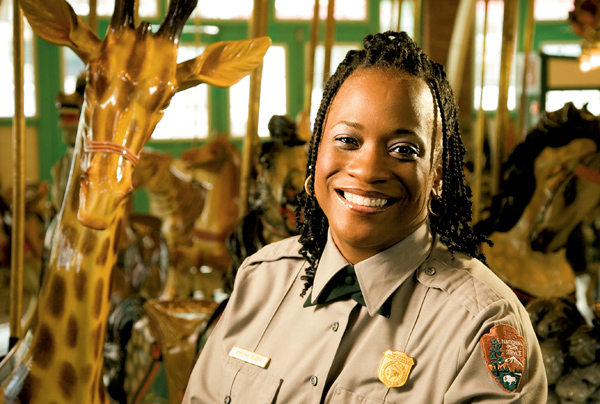Back in the 1970s, when her mother was a National Park Service ranger with seasonal duty at Montgomery County’s Glen Echo Park, Kym Elder would make a beeline for the merry-go-round.
While her mother patrolled the park’s grounds—still dotted with the crumbling façades of Glen Echo’s halcyon days—Elder climbed on the sculpted rabbits, roaring tigers, and bucking broncos of the park’s historic carousel. As the ride began to whirl beneath the canopy’s blinking lights, Elder clung to a brass pole, the world around her becoming a bright blur. The cost of her revelry: 50 cents.
Only when Elder returned to Glen Echo in 2005 as manager of the newly renovated park did she learn the true cost of those innocent afternoons of amusement—and who paid it. When Elder told family and friends at Brown Memorial AME Church near her childhood home in Southeast DC about her new job, out poured stories of the park’s segregated past and the fateful summer of 1960.
On June 30 of that year, business was bustling at Glen Echo, then a privately owned amusement park. Trolleys would pick up passengers at Union Station, amble up MacArthur Boulevard, and drop them off at the park’s entrance. Roller coasters roared above shade trees. From the sandy beach, sunbathers watched divers crease the Crystal Pool. The penny arcade clinked with the loose change of teenagers on cheap dates. The ornate Spanish Ballroom awaited its nightly crowd of swing dancers. The smell of popcorn and the tune of the carousel filled the air.
But when a group of students from Howard University mounted the merry-go-round that afternoon, everything halted. Montgomery County police officers stationed in the castlelike Chautauqua Tower approached the students.
“Can I ask your race?” one asked.
“I belong to the human race,” a student replied.
Since 1899, when it was converted from an educational community to an amusement park, African-Americans hadn’t been allowed at Glen Echo. Now in 1960, six years after Brown v. Board of Education had legally desegregated the nation’s schools, Glen Echo’s owners, Abram and Samuel Baker, showed no sign of changing.
The protesters—among them 18-year-old Gwendolyn Britt—were escorted off the premises by police car. But they showed up again the next day and the next—for five weeks. Jewish residents from Bethesda’s nearby Bannockburn neighborhood pitched in. A. Philip Randolph, the union organizer who later helped plan the 1963 March on Washington, added his baritone voice and towering presence.
By the end of the summer, the gates were still closed to blacks. Fines had been handed out to demonstrators and upheld by Maryland courts. Britt had been arrested, spat at, and cursed. But by the spring of 1961, public outcry forced the park’s owners to open its gates to everyone. In 1964, the Supreme Court ruled it unconstitutional for public officials to enforce segregation in private facilities.
Gwendolyn Britt continued her civil-rights activism—in 1961 she spent 40 days in jail for sitting in a whites-only train station in Alabama. After retiring from a career in business and personnel management, she was elected to the Maryland Senate from Prince George’s County in 2002. When she died in January of this year at age 66, she was still pressing for the rights of minority groups.
In the newly integrated Glen Echo Park, Kym Elder’s father won a white teddy bear for his bride. And the couple was there on Easter Monday 1966 when riots broke out after several rides were shut down and buses refused to transport the predominantly black crowd back into DC.
The theme park closed two years later and sat in disrepair until the National Park Service took over in 1970. Since then, the Washington landmark has stood as a reminder of a bygone era.
After studying the park’s past, Kym Elder got in touch with Gwendolyn Britt. She asked Britt if she’d been scared.
“No,” Britt said. “It was just the right thing to do.”
Elder is dedicating the first carousel ride of the 2008 season—on April 26—to Britt’s memory.
“This kind of thing happened all over the country,” Elder says. “But it’s amazing to think that a group of students and a neighborhood decided that they were going to make a difference right here.”
This article is from the May 2008 issue of The Washingtonian. For more articles from the issue, click here.
More>> Capital Comment Blog | News & Politics | Society Photos



















